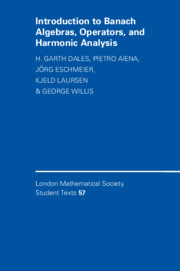Book contents
- Frontmatter
- Contents
- Preface
- Part I Banach algebras
- Part II Harmonic analysis and amenability
- Part III Invariant subspaces
- Part IV Local spectral theory
- Part V Single-valued extension property and Fredholm theory
- 26 Semi-regular operators
- 27 The single-valued extension property
- 28 SVEP for semi-Fredholm operators
- Index of symbols
- Subject index
27 - The single-valued extension property
Published online by Cambridge University Press: 29 December 2009
- Frontmatter
- Contents
- Preface
- Part I Banach algebras
- Part II Harmonic analysis and amenability
- Part III Invariant subspaces
- Part IV Local spectral theory
- Part V Single-valued extension property and Fredholm theory
- 26 Semi-regular operators
- 27 The single-valued extension property
- 28 SVEP for semi-Fredholm operators
- Index of symbols
- Subject index
Summary
The basic role of the single-valued extension property (SVEP) arises in the spectral decomposition theory, since every decomposable operator T enjoys this property, as does its dual T′. Indeed, in part IV, Chapter 21 it has been shown that the decomposability of an operator may be viewed as the union of two properties, the so-called Bishop's property (β) and the property (δ). Property (β) for T implies the SVEP for T (see part IV, Chapter 21) and, as observed in part IV, Chapter 23, properties (β) and (δ) have a complete duality, so that, if T has (δ), then the dual T′ has (β) and therefore SVEP.
The main goal of this chapter is to investigate in detail a localized version of SVEP. First we shall show that local spectral theory provides a suitable frame for some characterizations of the analytical core and of the quasi-nilpotent part. Then we shall use these characterizations to describe the localized SVEP by means of a variety of conditions that involve the analytical core and the quasinilpotent part of an operator, as well as the generalized range and the generalized kernel.
The SVEP at a point
To explain the role of SVEP in local spectral theory we begin with some preliminary and well-known facts from operator theory.
- Type
- Chapter
- Information
- Publisher: Cambridge University PressPrint publication year: 2003



